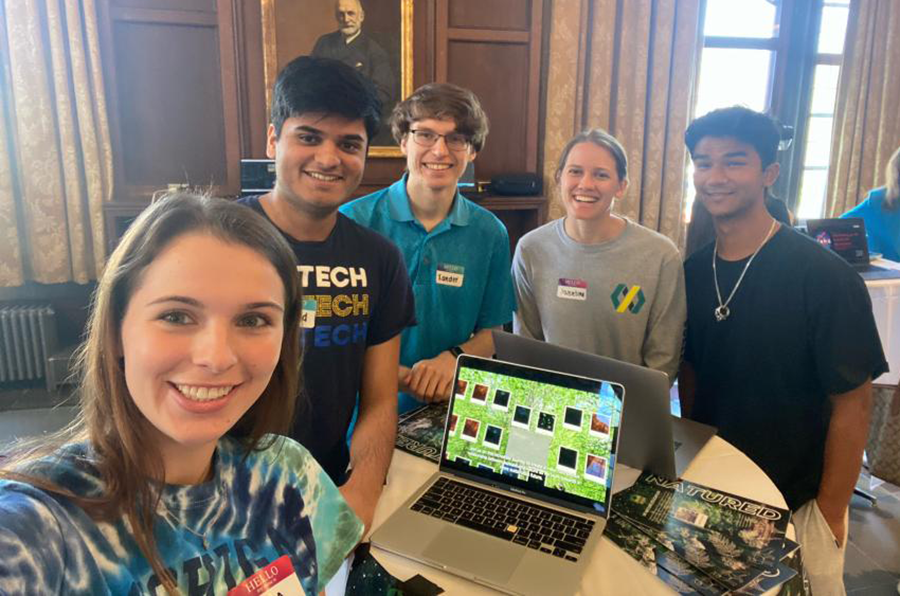CSE students win showcase at XR at Michigan Summit

A team of five undergraduate computer science students, Callie Hastie, Xander Stewart, Jacqueline DiMonte, Shawn Meah, and Govind Suresh, were recognized at the recent Extended Reality (XR) at Michigan Summit, winning the event’s student showcase with their innovative NaturEd virtual reality program. The campus-wide XR at Michigan Summit, which took place April 18-19 and was hosted by the Center for Academic Innovation, brought together more than 300 industry leaders, faculty, and students to discuss and learn about the future of XR in education. This was the summit’s third annual, and first in-person, iteration.
The event gave students the opportunity to learn from and present their own work to top innovators in the field, with top industry players such as Microsoft, Accenture, SimX, and more in attendance.
The winning team’s NaturEd program was a result of their capstone project for EECS 498 XR and Society, taught by Austin Yarger, which centers on “taking bleeding-edge virtual reality and augmented reality technologies and finding a way to use them for societal impact,” as Yarger describes.
NaturEd combines outdoor exploration and education, placing users in a wilderness environment and guiding them through various outdoor and survival activities, from using a compass to determining which plants are safe to eat. The goal of NaturEd is to make skills that might be difficult to learn without certain resources much easier to access. As Yarger puts it, “NaturEd is all about making that outdoor exploration very, very cheap and very, very accessible. Someone can go to their local library, find a VR headset, put that headset on, and be transported into a semi-realistic nature environment where they can discover and learn these things in a risk-free environment.”
Shawn Meah, one of the students on the NaturEd team, reiterates this, citing the primary goal of their project as “fostering familiarity and empathy for nature, especially for those who want to learn survival skills in a hands-on way but hesitate to or can’t spend time outdoors for whatever reason.”
To accomplish this, the NaturEd team sought to immerse users in an accurate outdoor environment. Meah notes, “we tried to make NaturEd as realistic as possible by deploying randomized environmental sounds and haptics in addition to high-definition and dynamically moving game objects such as sprinting foxes and swaying trees…The natural cues and realism of the game almost feel like real green-time.”
The result of these efforts is an immersive outdoor experience that empowers users to explore and learn valuable new skills, while also expressing their creativity. As Meah describes, “Users get to unleash their creativity and love for learning, unencumbered by survival requirements or any right way to play NaturEd.”
NaturEd is one of several student XR projects to come out of Yarger’s XR and Society course, many of which were also featured at the XR at Michigan Summit. The course, which was new to CSE this year, teaches students the fundamentals of XR, and then gives teams five weeks to develop their own games. Other programs developed in last semester’s course range from Orbit VR, a virtual reality game that allows users to navigate and complete tasks on the International Space Station, to a driving simulator that teaches users how to drive a stick shift.
Yarger’s course and the larger XR at Michigan Initiative are unique in providing students hands-on experience using and making things in XR, as well as empowering them to apply these emerging technologies to concrete social problems. As Yarger describes, “there are a lot of nontraditional applications for VR and AR that can teach users in a way that a textbook or video never really could.” This capability, Yarger emphasizes, is “a very powerful thing.”
NaturEd and the other student XR projects from the EECS 498 course are available at https://umichxr.com/. More information about the University of Michigan XR Initiative can be found here.
 MENU
MENU